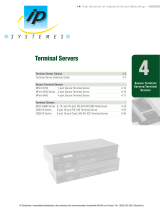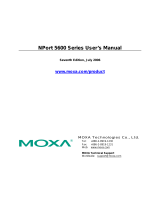
- 2 -
Overview
Introduction
The TCF-142-RM series fiber converters are slide-in modules that can be
installed in the NRack System’s rackmount chassis, such as the TRC-190 series.
The slide-in module is equipped with a multiple interface circuit that can
handle RS-232 or RS-422/485 serial interfaces, and multi-mode or single-mode
fiber. The TCF-142-RM series slide-in modules are used to extend serial
transmission distance up to 5 km (TCF-142-M-XX-RM, with multi-mode fiber)
or up to 40 km (TCF-142-S-XX-RM, with single-mode fiber).
Why Convert Serial to Fiber?
Fiber communication not only extends the communication distance, but also
provides many advantageous features. IMMUNITY FROM ELECTRICAL
INTERFERENCE: Fiber is not affected by electromagnetic interference or
radio frequency interference. It provides a clean communication path and is
immune to cross-talk. INSULATION: Optical fiber is an insulator; the glass
fiber eliminates the need for using electric currents as the communication
medium. SECURITY: Fiber cannot be tapped by conventional electric means
and is very difficult to tap into optically. Furthermore, radio and satellite
communication signals can be captured easily for decoding. RELIABILITY &
MAINTENANCE: Fiber is immune to adverse temperature and moisture
conditions, does not corrode or lose its signal, and is not affected by short
circuits, power surges, or static electricity.
No Configuration Required for Baudrate Settings
The TCF-142-RM slide-in modules work under any baudrate from 50 bps to
921.6 Kbps. The TCF-142-RM slide-in modules simply convert the signal back
and forth between serial (RS-232, RS-422, or RS-485) and fiber, and since the
TCF-142-RM slide-in modules do not need to interpret the signal, it does not
need to know the baudrate of the transmitting device. For this reason, the
TCF-142-RM slide-in modules do not have any DIP switches or jumpers for
setting the baudrate.
Ring Mode
To allow one half-duplex serial device to communicate with multiple
half-duplex devices connected to a fiber ring, you should configure the
TCF-142-RM slide-in modules for “ring mode” by setting DIP switch “SW3”
to the “On” position. The Tx port of a particular TCF-142-RM slide-in
modules unit connects to the neighboring converter’s Rx port to form the ring.
Note that when one node transmits a signal, the signal travels around the ring
until it returns to the transmitting unit, which then blocks the signal. Users
should ensure that the total fiber ring length is less than 100 km when using
either single-mode models or multi-mode models.













